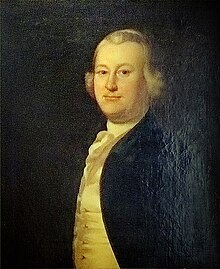Stamp Act Congress
The Congress met in the building where Federal Hall now stands and was held at a time of widespread protests in the colonies, some violent, against the Stamp Act's implementation.
"[1] In the aftermath of the French and Indian War, the British Parliament sought to increase revenues from its overseas colonies, where the cost of stationing troops had become significant.
British Prime Minister George Grenville noted at the time of the Sugar Act's passage that a stamp tax might also be necessary, immediately raising concern and protest in the colonies.
"[5] Nine of the British America continental colonies ultimately selected delegates to attend the congress: Massachusetts, Rhode Island, Connecticut, New York, New Jersey, Pennsylvania, Delaware, Maryland, and South Carolina.
[10] Maryland's assembly, prorogued because of a smallpox outbreak, was finally called into session by Governor Horatio Sharpe to consider the Massachusetts letter on September 23, and delegates were chosen.
[13] North Carolina Lieutenant Governor William Tryon had prorogued the assembly for other reasons, and there was apparently no action taken to request a special session despite public protests and opposition to the act by Speaker John Ashe.
[14] Nova Scotia, which then included present-day Prince Edward Island and New Brunswick, declined to send delegates despite significant economic connections to Massachusetts and a strong presence of expatriate New Englanders in its assembly.
[16] When word of the pending congress reached London, the Lords of Trade were so disturbed that they wrote to the king that "this is a matter of the utmost importance to the Kingdom and legislature of Great Britain... and proper only for the consideration of Parliament.
[17] The trade commissioners also noted that "this appears to us to be the first instance of any General Congress appointed by the Assemblies of the Colonies without the Authority of the Crown, a Measure which we Conceive of dangerous Tendency in itself.
The Congress elected Timothy Ruggles, a conservative Massachusetts delegate, as its chairman, narrowly rejecting James Otis, who John Adams described as "the soul" of the body.
New York delegate Robert Livingston wrote that the Congress was designed to insure the unity of the British Empire: "if I really wished to see America in a state of independence, I should desire as one of the most effectual means to that end that the stamp act should be inforced.
According to Delaware delegate Caesar Rodney, the drafting of the statement was made difficult by the desire to balance the colonists' rights with the royal prerogative and the acknowledged powers of Parliament.
Otis pointed out that the Massachusetts assembly had authorized its delegation to sign any jointly agreed documents and that Ruggles' suggestion undermined the purpose of the congress to present a united front.
The first six lay groundwork, proclaiming loyalty to the crown and asserting that according to the Rights of Englishmen and the more general "freedom of a people", only representatives chosen by the colonists could levy taxes.
The remaining statements protest the unconstitutionality of the Stamp Act; express the economic consequences, which, among other things, would reduce trade to the detriment of English manufacturers; and reiterated the rights of the colonists to petition the crown and Parliament.
The petitions directed to the House of Lords and the king were written in flattering tones, gently stating the liberties the colonists had enjoyed as British subjects and hoping they would retain them.
"[28] In contrast, the petition addressed to the House of Commons was more detailed, advancing economic arguments against the Stamp Act and requesting the repeal of legislation creating a jury-less vice admiralty court at Halifax.
[36] To address the constitutional issues raised by the North American protests, Parliament also passed the Declaratory Act, claiming the authority to legislate for the colonies "in all cases whatsoever".
[37] The Stamp Act Congress is generally viewed as one of the first organized and coordinated political actions of the American Revolution, though its participants were not at all yet focused on independence from Great Britain.
One copy of its journal, from the papers of Caesar Rodney, survives in the library at Rowan University in Glassboro, New Jersey,[39] and a second exists in the Connecticut state archives.

